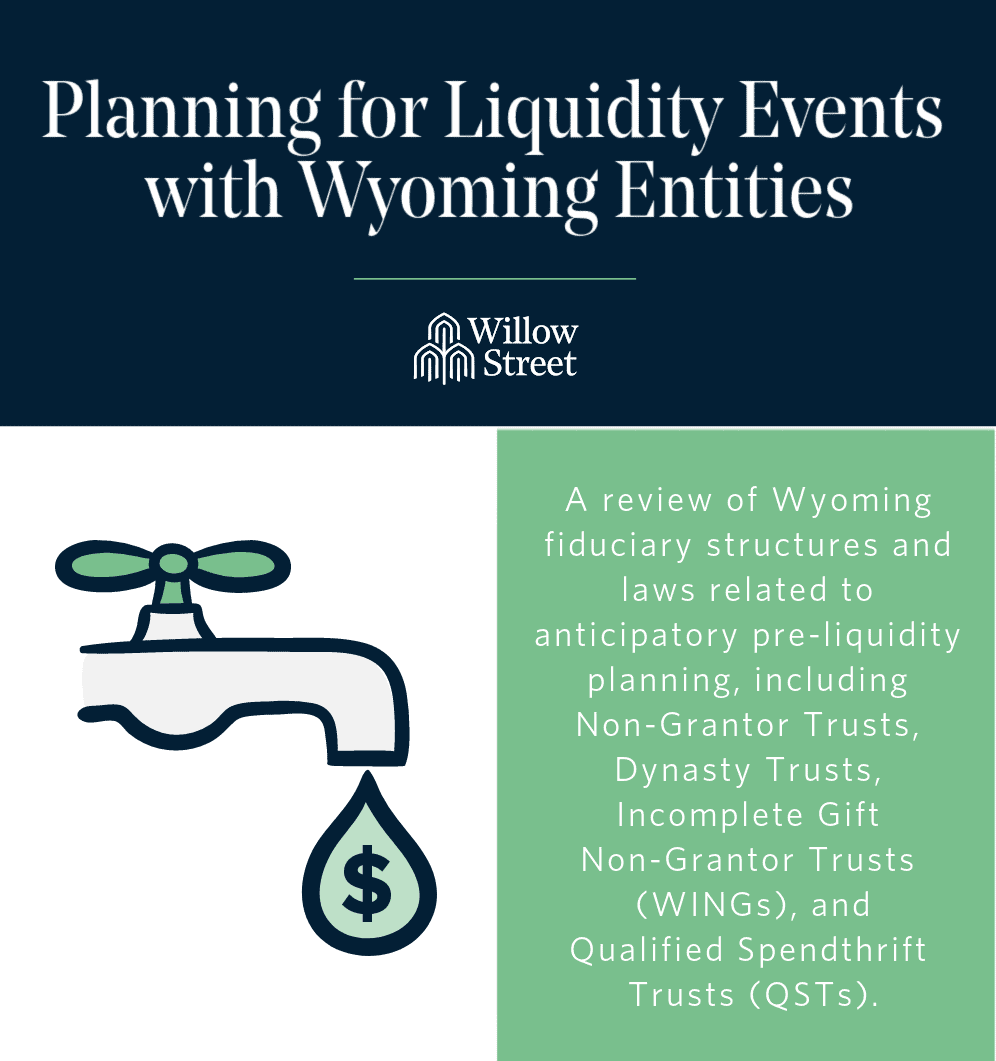For client families holding illiquid assets, anticipatory pre-liquidity planning can greatly improve asset planning, wealth transfer, and tax outcomes.
In this memo, also found below, Willow Street’s General Counsel and Chief Fiduciary Officer, Scott Weaver, reviews strategies for pre-liquidity planning using Wyoming entities and provides a snapshot of our state’s modern trust statues, asset planning laws, and tax laws.
Wyoming offers enhanced modern trust and business laws, a favorable tax environment, and retained client control with an emphasis on administrative and cost efficiency.

For clients holding illiquid assets, anticipatory pre-liquidity planning can greatly improve asset planning, wealth transfer, and tax outcomes. This memo reviews strategies for pre-liquidity planning using Wyoming fiduciary entities.
Client families look to Wyoming as an attractive jurisdiction for tax management, as Wyoming does not impose taxes on income, capital gains, estates, or gifts. While clients often initially consider Wyoming to manage tax exposure, they soon find that Wyoming entities also offer enhanced asset planning and wealth transfer benefits over many other jurisdictions.
Wyoming law permits long-duration (1,000 year) trusts, blind trusts, directed trusts, trust protectors/advisors, self-settled spendthrift trusts, statutory decanting, and both regulated and unregulated private trust companies (PTCs). Trusts are not required to register or report to any governmental entity in Wyoming and ownership of trust and LLC assets is not a matter of public record. All Wyoming trusts benefit from modern trust statutes and a highly responsive Banking Commissioner and legislature.
Clients who are unable or unwilling to physically relocate to Wyoming may wish to use Wyoming non-grantor trusts to resitus assets into the state. In order for a non-resident to create a Wyoming trust, there must always be at least one Wyoming trustee. Often, clients will employ a Wyoming PTC or Wyoming administrative trustee while maintaining existing investment advisory and asset management relationships.
If the client does not wish to retain access to assets, a complete gift non-grantor trust, sometimes referred to as a Wyoming Dynasty Trust, is often a useful strategy. Pre-liquidity assets are gifted to the trust via Annual Exclusion Gifts, the Unified Gift and Estate Tax Credit, or a combination of the two, and are often allocated Generation Skipping Transfer Tax (GST) Exemption. Following the liquidity event, the trust is responsible for paying any income taxes, and as a Wyoming entity, is not generally liable for income taxes in the Grantor’s home state. Assets are managed for the benefit of the Beneficiaries of the trust and are generally excluded from the estate tax regime for the lifetime of the trust (up to 1,000 years). The benefits of this structure are state-level income tax management, asset protection, and tax-efficient wealth transfer, especially when used in conjunction with the Wyoming Close LLC to maximize IRC § 2704(b) discounts. And, of course, Wyoming Dynasty Trusts may incorporate any number of modern administrative features discussed above. Wyoming Dynasty Trusts are ideal for portions of a client’s assets designated for multigenerational wealth transfer planning. The biggest downside to this structure is that the client may not benefit from or enjoy assets transferred to a Wyoming Dynasty Trust.
If the client does desire to retain access to the assets, the client may wish to consider an incomplete gift non-grantor trust, or an “ING.” In Wyoming, these trusts are referred to as a WING (Wyoming Incomplete Gift Non-Grantor) Trust. Such trusts have been recognized by the IRS in various Private Letter Rulings and have a complex structure in order to achieve a specific tax result. Essentially, a committee comprised of the client and interested beneficiaries have the right to make distributions from the trust based on a set of rules which satisfy IRS rules. A WING Trust is a stand-alone tax entity and is not subject to taxation in the client’s home state. The WING Trust may also qualify as a Wyoming Qualified Spendthrift Trust (QST), which is the Wyoming self-settled asset protection trust, sometimes also referred to as a Domestic Asset Protection Trust (DAPT). This way, the client can achieve income tax management, asset protection, and retained access to assets through the WING trust. The biggest downsides to the WING trust are that the client must sacrifice ultimate control of the distribution of the assets to the Distribution Committee and that the WING Trust does not constitute a completed gift for estate tax management and wealth transfer purposes. Often, structures are used in conjunction in order to accomplish different objectives.
Wyoming Legal Snapshot
Modern Trust Laws
- Rule Against Perpetuities: 1000 Years
- Directed Trust Statute
- Trust Protector Statute
- Reform & Decanting Statute
- Non-Judicial Settlement Agreement
- Special Purpose Entities Yes
- Enhanced Virtual Representation
- Privacy Laws
- Automatic Seal of Trust Documents
- Regulated PTC Authorized
- Unregulated PTC Authorized
Taxation
- No State Income, Estate, or Inheritance Tax
- State Insurance Premium Tax 75 bps below $100K, 7.5 bps thereafter
Asset Protection (Discretionary Trust Protection)
- Type of Exception: Creditor Child Support
- Sole Remedy Charging Order Protection
- Strong Definition of Discretionary via UTC
- Present Creditor Length of Time (years) 4/1 discovery
- Future Creditor Length of Time (years) 4
- Self-Settled Trust Legislation Yes
The structures contemplated herein are complex and there are numerous details to consider. Willow Street does not provide legal advice or services; this information is provided for educational purposes and should not be relied upon as legal or tax advice. Please contact Willow Street for more information regarding the strategies discussed herein, trust administrative services, or general benefits of Wyoming planning.




